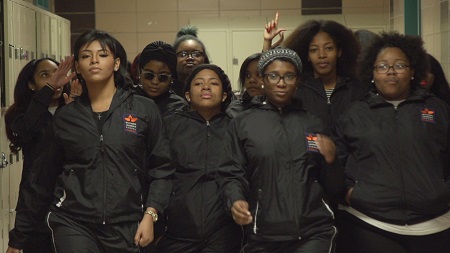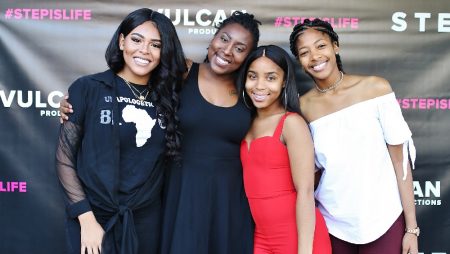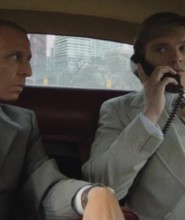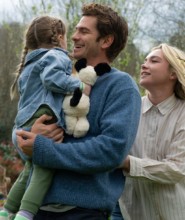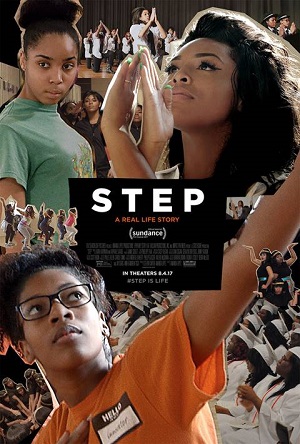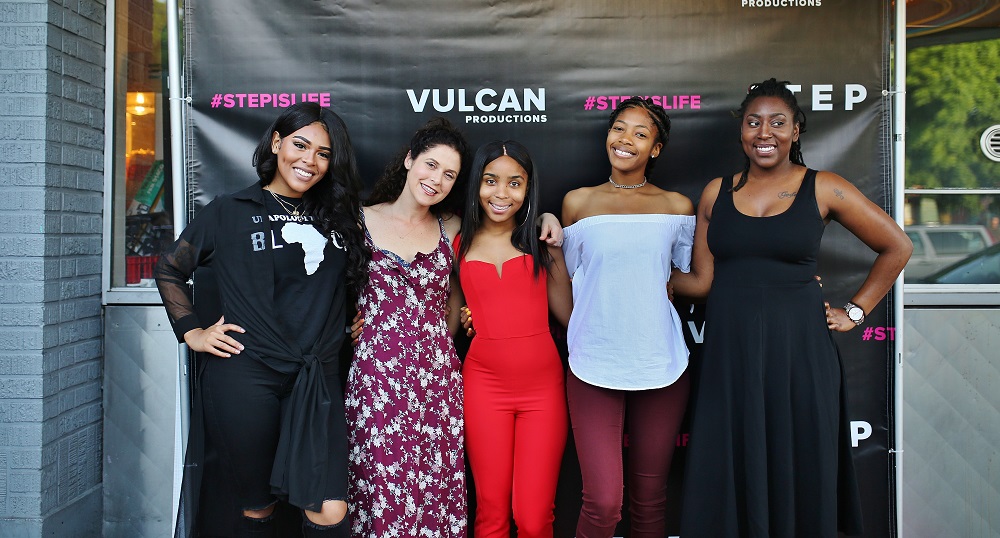
“Step” – Interview with Gari “Coach G” McIntyre
by Sara Michelle Fetters - August 10th, 2017 - Film Festivals Interviews
a SIFF 2017 interview
Paying it Forward
Step’s Coach G on Changing One Life at a Time
After taking the Sundance Film Festival by storm back in January, the rousing, life-affirming documentary Step finally goes into general release. The film chronicles a year in the life of the Lethal Ladies of BLSYW (Baltimore Leadership School for Young Women) Step Team, the team’s Senior members going to be the first students to graduate from their all-girls Baltimore school. Not only are they all looking for a winning season, their collective story also unfolds with the knowledge that their school’s goal is for every member of this graduating class to be accepted into college. More, their inner city tale also takes place in the wake of Freddie Gray’s death at the hands of the police just one year prior, the explosive aftermath of those events and what it has meant for their community casting a shadow they’re all still standing in whether they realize it or not.
Directed by veteran Broadway producer Amanda Lipitz, the film is a mesmerizing adventure filled with ups, downs, in-betweens, insights, fights, failures and success. It chronicles the long road this girls go on to go from being individuals to being teammates, their collective struggles a magnificently intimate sojourn into life in all its delicately unsettling yet beautifully distinctive minutia. In many ways it is a female-driven Hoop Dreams, these magnificent Lethal Ladies delivering life lessons the likes of which will cause even the hardest heart to soar into the stratosphere thanks in large part to this story’s stirring, universally empowering splendor.
While the focus is on the members of the team, most notably three seniors, Blessin Giraldo, Tayla Solomon and Cori Grainger, each with their own goals and dreams but all determined to see their entire team meet with success, Lipitz also makes time to spotlight a number of the adults helping these Lethal Ladies graduate from school, get into college and achieve victory as a Step team. One of the most important members of that group is the team’s new coach Gari “Coach G” McIntyre. I had the privilege to sit down with Coach G while she and other members of the Step family were in town for the Seattle International Film Festival this past June. Here are some of the highlights from our all too brief conversation:
Sara Michelle Fetters: When did you know that this film was happening and what were your initial thoughts?
Gari “Coach G” McIntyre: First of all, I was hired as a Step coach, so [the school] needed a Step Coach regardless if the documentary was happening or not. I was scouted and hired to be a Step coach [but they] did tell me about the documentary. They were very transparent about the fact that it was happening and there would be some filming, but I didn’t know to what extent. Step would be happening regardless, so I was told, do your job, do you and creatively be yourself. They just wanted a great Step coach.
When I first met Amanda, I can’t even describe in words that first interaction. I don’t know much about Broadway. The most I know is like The Lion King and The Color Purple and Hamilton. Like the bigger Broadway plays. She comes in and she’s so full of life and so full of everything, and she had a big connection with the girls. I’m just like, “Girl, back off.” [laughs] She was just so in your face and passionate about her project. I was like, I’m just here to be the Step coach.
I never knew how important Step would be in the film, how involved Step would be in this project. When I took the job I took it as a Step coach and as a woman who, regardless if the cameras are rolling, this was what I was doing and this was how I would do it. The fact that we did have a lot of cameras, I think I went above and beyond to be a raw me which I now regret after looking at the footage ce. The girls when the cameras would come, would be in the bathroom doing their makeup and other stuff. I’d be like, “What are you doing? You’re going to run an extra lap for being late.” I maybe should have been with them. Who knows? [laughs]
Sara Michelle Fetters: See? That’s what makes you a good coach. You were focused on the bigger picture, and not the movie picture.
Coach G: Absolutely. I never worked for worked for Amanda. I was never compensated by Amanda. And that’s how it should have been. I gave her a lot of pushback because I was like, you’re not going to tell me what we’re going to do. She would come up with suggestions and I’m like, I’ll consider it, but I’m running this show boo. I gave her a lot of pushback creatively on what Step was and what this Step Team is to me. But that was my job. I took a lot of pride in it whether the cameras were there or not. I was going to be doing that. It’s what God called me to do, and I had a mission to reach one girl. Just one girl. Make a difference in one girl’s life. Now, all these months later, I suddenly have 19 daughters.
Sara Michelle Fetters: I got the feeling you would be a coach that anybody would be lucky to have. Who is Coach G? What inspires Coach G? What makes Coach G want to be that person you’re describing?
Coach G: What inspires me is my family, the coaches that came before me, the coaches that are better than me, more talented than me and who choreography-wise I can’t even touch. That’s what inspires me. My coaches who taught me to Step and invested in me. My coach Miss A. My coach Mr. Simms. I was on a Step team in middle school and I identify with each of the girls I coach, and that inspires me. The fact I could see myself in all 19 of these girls in some way. Blessin in not having food. Cori not having lights. Tayla having to push back about dealing with boys and her mom saying, “Don’t mess with boys. They have cooties.” I can relate to them on levels that touched me. Thank God for my struggles and what I’ve been through. My family. My boyfriend. My grandmother. She, in particular, is very instrumental in who I am today at giving back, of sewing the seed of paying it forward.
Sara Michelle Fetters: There are a couple scenes in the movie where you do start talking about yourself and your past. Whether it’s to Blessin or when you’re talking to the camera a couple times, I think it’s very noticeable that you get emotional having these conversations. Is it hard for you to have these conversations? Or is it difficult because you know what your story is and what you had to go through to become this person you are now? That you’re seeing the best for these kids and you don’t want them to have to deal with any of the things you did?
Coach G: Yes. That’s exactly it. I want them to learn from every single mistake that I’ve ever made in my life. Like I said, I dropped out multiple times in college, withdrew from classes, spent all my refund check money. I’ve made so many mistakes and people were not transparent. My mentors were not transparent about the mistakes that they made. I was not transparent about what it was I was doing.
I just want to protect my students from all the evils of the world. I want to protect them from making every single F-up I ever did in life, and I want them to be great. I see the best Tayla. I see the best Blessin. I see the best Cori. But when I see them doing stupid things, I call them out because it just wouldn’t be me if I didn’t. I’m very transparent now. I’m very upfront. If you serve me BS I’m not going to have it.
Sara Michelle Fetters: From an athletic standpoint, when you have those girls on that wall, that is the best and the worst moment. It’s the best moment because I’m just sitting there in the theatre thinking of all those days playing sports in High School and College where I had to either sit on a wall like that or do something similar. It’s the worst of moments because you’ve been forced to teach them a lesson and get them all back on the right track. Sitting on the wall, it’s not just about getting people in shape, it’s about teaching them a lesson as kids growing into becoming adults. It’s about making them teammates.
Coach G: In that moment it was about both. At the time I was working three jobs. I had just come in from my second job. I had worked two 8-hour shifts and I came in and it was kind of like, this kids is wearing Uggs, this one is late, this other one is on her phone. What do you guys think I’m here for? To twiddle my thumbs? Absolutely not.
From an athletic standpoint, those guys needed to know what it’s like to suffer as a team. Absolutely. You need to know what it’s like to go through something rough as a team. I had one girl crying in tears, which they did not put in the film. I mean literally boo-hooing. She couldn’t stand it. She was like, “I can’t do it.” I was like, “maybe you can’t, but she can, and so can she, so you guys got to figure it out. You need to figure it out together.” And they did. They found a way to stay on the wall as a unit. As a team.
The life lesson was to appreciate those who spend time and sew their seeds into you, because you have to pay that forward. Had they not had that time on the wall, the reward of their later victories wouldn’t have been so sweet because these are things you do as a team. What was the main thing that Blessin was saying to me when I first got hired? “We don’t do things like a team. We don’t look like a team. We’re not really giving that team effort.” I’m like, “I can whip y’all into shape, but y’all got to act like y’all want it.” What was a slap in the face to me constantly was they kept saying they wanted to be a team, but all of the tactics that I was giving them in a nice way, they weren’t getting. You ain’t getting it the right way, then I’m going to give it to you the rough way. You’re going to sit on the wall.
Sara Michelle Fetters: I think the other key is you were able to figure out that each girl’s personal life was also affecting things. I think one of the great things about athletics is we all come from different places. We all have different things going on in our lives that nobody else is knowing about. But once you come together in a group, you have to figure out a way to use that stuff as fuel to help you become a team. How difficult was it to get these girls to believe that? How did it feel when you saw them get there?
Coach G: They were very conscious of all of these things. Individually they were like, we want to be a team. We want to look good. For the life of the team, though, they just could not say, what was holding them back. Blessin would never admit until the very end that she needed to be around the team to feel better. She acts tough for a good amount of the season, and Amanda made it pretty, but you know what? She really acted out. And there was Cori going through the things that she was going through. Tayla and what she had to deal with. Then the girls who aren’t highlighted whose parents were getting divorces, who also didn’t have food. When I said someone didn’t have a refrigerator in the film, that was a fact. One girl on the team did not have a refrigerator. So those were the challenges, and they had to overcome those individuals and together in order to become a team.
The sweet thing was having them sitting on that wall learning how to work together, giving them the track suits, and then winning Bowie State. That’s where the trust came in. You have now an undefeated season. You won every competition you’ve been to because you have used the tools that I’ve given you. I didn’t have to slap you 10,000 times. Maybe 9,000, but I didn’t have to slap you 10,000 times to remind you that you all are a team. They were starting to let their hair down and feel each other out, feel each other’s vibes and be together. The big reward was to have them look to me and say, “I get it. We are a team. We are together, and when we get together it’s like butter.”
Sara Michelle Fetters: You can never predict what’s going to happen from this point forward, but how proud are you these young women? And what do you hope for all of them moving forward?
Coach G: As a team, not the girls who are specifically highlighted, but as a team they want to Step and continue to perform. A few of them want to do show business. I think that those are things that are going to shine out.
For Cori, one of the specific things to me is to see her transition from a big fish in a small pond to a big fish in a large pond, because everyone is Valedictorian at her school, everyone is Top of the Class, so to see her excel in that environment? I’m just so proud. To hear her call me and say, I got an A in this class, or I got an A on this test, it’s amazing.
Tayla wants to do Urban Planning and she wants to, in essence, do what I’m doing but on a bigger level. She wants to build recreation centers and those things. That’s amazing. That’s paying it forward.
Blessin wants to go into show business, and I have such great hopes for her.
For me, looking back, to see them still being a team, it fills my soul. We were just together two weeks ago for MTV, performing for Michelle Obama, and it was like the last time we were together was at Sundance. That was four months ago. To see everyone get together and not miss a beat, that is so rewarding to me, because that’s what I instilled in them.
Sara Michelle Fetters: For general audiences, what do you hope they take away from the movie? What do you hope they learn?
Coach G: I hope that they’ll talk to me about hope, because [Step] is a movie in a time where hope is needed, where women coming together and making a difference as they always have is so important. I hope that people are talking about education and expanding education, putting more money and time into schools. I hope that mentors or coaches or people who never thought about being mentors or coaches are having conversation to get involved with someone, because if you reach only one person, there’s no telling how many lives may change or be impacted. Most importantly, I hope that when people see this movie, they realize that everyone has a mother, because that’s what this movie is about: Mothers and families. About women changing the world as we always have.
– Interview reprinted courtesy of the SGN in Seattle
